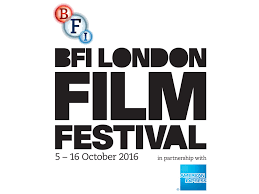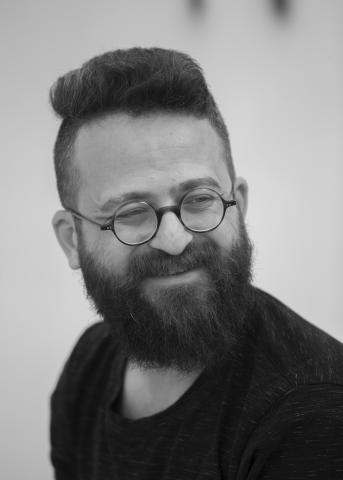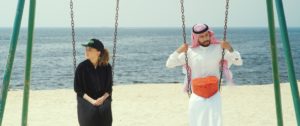The BFI London Film Festival celebrates an impressive 60 years this year. Launching this week Britain’s leading film festival takes place over 12 days and will bring 249 feature films and 145 shorts, including features and documentaries, live action and animated works. With 74 countries participating, there will be 39 world, twelve international, 49 European and eight world restoration premieres. Up for grabs also are the prestigious LFF Best Film Award, the Grierson Award for Documentary, the Sutherland Award for First Feature and the Short Film Award.
The screenings can be viewed across fourteen London cinemas, including: the BFI Southbank, the Institute of Contemporary Arts (ICA), the RItzy Cinema, the Curzon Cinemas, the Vue West End, the Embankment Garden Cinema and others. Part of the festival will also feature a stellar line-up of directors, cast and crew who are expected to take part in career interviews, screen talks, Q+As and Industry talks for those interested to learn more from behind the scenes.
Relevant to the MENA region, there are at least 20 titles that I picked out, with works from: Egypt, Syria, Saudi Arabia, the United Arab Emirates (UAE), Tunisia, Qatar, Morocco, Lebanon and Jordan. To help you easily navigate the BFI LFF website, I have listed below the film titles with names of directors, the country of production and the genre-category by which they are registered. I do advise early booking as many of these screenings include world premieres and sell out fast.
Barakah Meets Barakah
Director: Mahmoud Sabbagh
Production: Saudi Arabia (2016)
Genre: Laugh
Showing: Thu 6 October, 6.30pm at Curzon Soho
Showing: Sat 8 October, 8.30pm at Ciné Lumière
Link: https://whatson.bfi.org.uk/lff/Online/default.asp?BOparam::WScontent::lo…
Farouk, Besieged Like Me (Mouhassaron Mithli)
Director: Hala Alabdalla
Production: Syria-France (2016)
Genre: Debate
Showing: Fri 7 October, 6.15pm at BFI Southbank NFT2
Showing: Sat 8 October, 3pm at Ciné Lumière
Link: https://whatson.bfi.org.uk/lff/Online/default.asp?BOparam::WScontent::lo…
In the Last Days of the City (Akher Ayam El Medina)
Director: Tamer El Said
Production: Egypt-Germany-UK (2016)
Genre: Debate
Showing: Sun 9, October, 8.45pm at Picturehouse Central
Showing: Tue 11 October, 3.30pm at BFI Southbank NFT2
Link: https://whatson.bfi.org.uk/lff/Online/default.asp?BOparam::WScontent::lo…
Hedi (Inhebbek Hedi)
Director: Mohamed Ben Attia
Production: Tunisia-Belgium-France-Qatar-UAE (2016)
Genre: First Feature Competition
Showing: Tue 11 October, 9pm at ICA
Showing: Wed 12 October, 1.15pm at BFI Southbank NFT3
Showing: Sat 15 October, 3.45pm at Ciné Lumière
Link: https://whatson.bfi.org.uk/lff/Online/default.asp?BOparam::WScontent::lo…
Mimosas
Director: Oliver Laxe
Production: Qatar-Morocco-Spain-France (2016)
Genre: Journey
Showing: Thu 6 October, 9pm at BFI Southbank NFT3
Showing: Fri 7 October, 1pm at ICA
Link: https://whatson.bfi.org.uk/lff/Online/default.asp?BOparam::WScontent::lo…
Tickling Giants
Director: Sara Taksler
Production: Egypt-UK-US (2016)
Genre: Laugh
Showing: Wed 12 October, 6pm at VUE West End Screen 7
Showing: Sat 15 October, 6.15pm at BFI Southbank NFT2
LInk: Link: https://whatson.bfi.org.uk/lff/Online/default.asp?BOparam::WScontent::lo…
Tramontane
Director: Vatche Boulghourjian
Production: Lebanon-France (2016)
Genre: Journey
Showing: Sun 9 October, 1pm at Ritzy Cinema
Showing: Wed 12 October, 6.30pm at BFI Southbank NFT2
Link: https://whatson.bfi.org.uk/lff/Online/default.asp?BOparam::WScontent::lo…
Clash (Eshtebak)
Director: Mohamed Diab
Production: Egypt (2016)
Genre: Official Competition
Showing: Wed 12 October, 8.45pm at Embankment Garden Cinema
Showing; Thu 13 October, 2.30pm at Embankment Garden Cinema
Link: https://whatson.bfi.org.uk/lff/Online/default.asp?BOparam::WScontent::lo…
A Day for Women (Yom Lel Setat)
Director: Kamla Abouzekri
Production: Egypt (2016)
Genre: Debate
Showing; Thu 6 October, 8.45pm at Picturehouse Central
Showing: Fri 7 October, 1pm at BFI Southbank NFT3
Link: https://whatson.bfi.org.uk/lff/Online/default.asp?BOparam::WScontent::lo…
Adieu Bonaparte
Director: Youssef Chahine
Production: Egypt-France (1984)
Genre: Debate
Showing; Fri 7 October, 8.45pm at BFI Southbank NFT2
Link: https://whatson.bfi.org.uk/lff/Online/default.asp?BOparam::WScontent::lo…
The Worthy
Director: Ali F Mostfa
Production: UAE (2016)
Genre: Dare
Showing; Sat 8 October, 6pm at VUE West End Screen 7
Showing: Sun 9 October, 6.15pm at ICA
Showing: Sat 15 October, 9pm at Curzon Mayfair
Link: https://whatson.bfi.org.uk/lff/Online/default.asp?BOparam::WScontent::lo…
Layla M
Director: Mijke de Jong
Production: Jordan-Netherlands-Belgium-Germany (2016)
Genre: Official Competition
Showing: Tue 11 October, 6pm at Embankment Garden Cinema
Showing: Thu 13 October, 12noon at Embankment Garden Cinema
Link: https://whatson.bfi.org.uk/lff/Online/default.asp?BOparam::WScontent::lo…
Divines
Director: Houda Benyamina
Production: Qatar-France (2016)
Genre: First Feature Competition
Showing: Thu 6 October, 6.15pm at Haymarket Cinema
Showing: Fri 7 October, 3.30pm at BFI Southbank NFT2
Showing: Tue 11 October, 6.30pm at Ritzy Cinema
Link: https://whatson.bfi.org.uk/lff/Online/default.asp?BOparam::WScontent::lo…
The War Show
Directors: Andreas Dalsgaard and Obaidah Zytoon
Production: Syria-Finland-Denmark (2016)
Genre: Documentary Competition
Showing: Thu 13 October, 6pm at VUE West End Screen 7
Showing: Sat 15 October, 12.45noon at Curzon Mayfair
Link: https://whatson.bfi.org.uk/lff/Online/default.asp?BOparam::WScontent::lo…
9 Days – From My Window in Aleppo
Director: Issa Touma
Production: Syria-Netherlands (2015)
Genre: Debate
Showing: Sun 9 October, 3.45pm at ICA
Showing: Mon 10 October, 6pm at BFI Southbank NFT3
Link: https://whatson.bfi.org.uk/lff/Online/default.asp?BOparam::WScontent::lo…
Battalion To My Heart (2016): Algeria-US-Western Sahara
Director: Elmi Imanishi
Genre: Debate
Showing: Sun 9 October, 3.45pm at ICA
Showing; 10 October, 6pm at NFT3
Link: https://whatson.bfi.org.uk/lff/Online/default.asp?BOparam::WScontent::lo…
Letters from Baghdad
Directors: Sabine Krayenbuhl and Zeya Oelbaum
Production: UK-US (2016)
Genre: Journey
Showing: Sun 9 October, 3.30pm at Haymarket Cinema
Showing: Mon 10 October, 8.45pm at BFI Southbank NFT2
Link: https://whatson.bfi.org.uk/lff/Online/default.asp?BOparam::WScontent::lo…
Moderation
Director: Anja Kirschner
Production: Egypt- Greece-Italy-UK (2016)
Genre: Experimenta
Showing: Sat 15, October, 8.15pm at BFI Southbank NFT3
Link: https://whatson.bfi.org.uk/lff/Online/default.asp?BOparam::WScontent::lo…
In the Future, They Ate from the Finest Porcelain
Director: Larissa Sansour
Production: Qatar-UK-Denmark
Genre: Experimenta
Showing: Fri 7 October, 6.30pm at BFI Southbank NFT3
Link: https://whatson.bfi.org.uk/lff/Online/default.asp?BOparam::WScontent::lo…
Ruins of Palmyra and Baalbeck
Director: Jack Cardiff
Production: (1938)
Genre: Dare
Showing: Sun 9 October, 12.30noon at BFI Southbank NFT2
Link: https://whatson.bfi.org.uk/lff/Online/default.asp?BOparam::WScontent::lo…
Note: This article was first published circa October 2016





